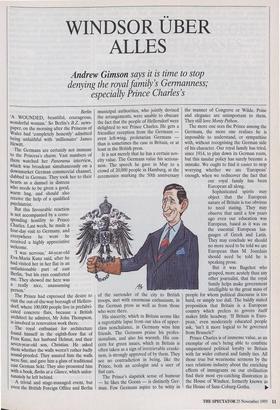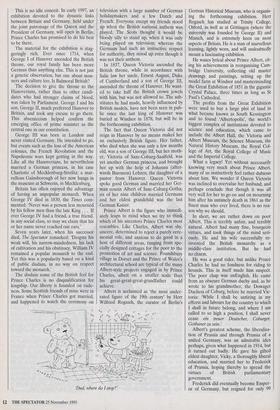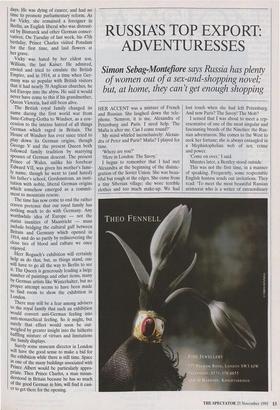WINDSOR OBER ALLES
Andrew Gimson says it is time to stop
denying the royal family's Germanness; especially Prince Charles's
Berlin 'A WOUNDED, beautiful, courageous, wonderful woman.' So Berlin's B.Z. news- paper, on the morning after the Princess of Wales had 'completely honestly' admitted being unfaithful with 'millionaire' James Hewitt.
The Germans are certainly not immune to the Princess's charm. Vast numbers of them watched her Panorama interview, which was broadcast simultaneously on a downmarket German commercial channel, dubbed in German. They took her to their hearts as a damsel in distress who needs to be given a good, warm hug, and should also receive the help of a qualified psychiatrist.
But this favourable reaction is not accompanied by a corre- sponding hostility to Prince Charles. Last week, he made a four-day visit to Germany, and everywhere he went he received a highly appreciative welcome.
`I was nervous,' 44-year-old Eva-Maria Kunz said, after he had visited her in her flat in an unfashionable part of east Berlin, 'but his eyes comforted me. They showed me here was a really nice, unassuming person.'
The Prince had expressed the desire to visit the out-of-the-way borough of Hellers- dorf, where 100,000 people live in prefabri- cated concrete flats, because a British architect he admires, Mr John Thompson, Is involved in renovation work there.
The royal enthusiast for architecture found himself in the eighth-floor flat of Frau Kunz, her husband Helmut, and their seven-year-old son, Christian. He asked them whether the walls weren't rather badly sound-proofed. They assured him the walls were fine, and gave him a glass of traditional east German Sekt. They also presented him with a book, Berlin at a Glance, which unfor- tunately he left behind.
A trivial and stage-managed event, but even the British Foreign Office and Berlin municipal authorities, who jointly devised the arrangements, were unable to obscure the fact that the people of Hellersdorf were delighted to see Prince Charles. He gets a friendlier reception from the Germans — even left-wing, proletarian Germans than is sometimes the case in Britain, or at least in the British press.
It is not merely that he has a certain nov- elty value. The Germans value his serious- ness. The speech he gave in May to a crowd of 20,000 people in Hamburg, at the ceremonies marking the 50th anniversary of the surrender of the city to British troops, met with enormous enthusiasm, in the German press as well as from those who were there.
His sincerity, which in Britain seems like a regrettable lapse from our idea of upper- class nonchalance, in Germany wins him friends. The Germans praise his profes- sionalism, and also his warmth. His con- cern for green issues, which in Britain is often taken as a sign of irretrievable cranki- ness, is strongly approved of by them. They see no contradiction in being, like the Prince, both an ecologist and a user of fast cars.
The Prince's slapstick sense of humour — he likes the Goons — is distinctly Ger- man. Few Germans aspire to be witty in the manner of Congreve or Wilde. Poise and elegance are unimportant to them. They still love Monty Python.
The more one sees the Prince among the Germans, the more one realises he is impossible to understand, or sympathise with, without recognising the German side of his character. Our royal family has tried, since 1914, to play down its German roots, but this insular policy has surely become a mistake. We ought to find it easier to stop worrying whether we are 'European' enough, when we rediscover the fact that our royal family has been European all along.
Sophisticated spirits may object that the European nature of Britain is too obvious to need stating. They may observe that until a few years ago even our education was European, based as it was on the essential European lan- guages of Greek and Latin. They may conclude we should no more need to be told we are European than M. Jourdain should need be told he is speaking prose.
But it was Bagehot who grasped, more acutely than any other journalist, that the royal family helps make government intelligible to the great mass of people for whom political discourse is too hard, or simply too dull. The baldly stated proposition that Britain is a European country which prefers to govern itself makes little headway. 'If Britain is Euro- pean,' even moderately educated people ask, 'isn't it more logical to be governed from Brussels?'
Prince Charles is of immense value, as an exemplar of one's being able to combine unquestioned political loyalty to Britain with far wider cultural and family ties. All those true but wearisome sermons by the race relations industry about the enriching effects of immigrants on our civilisation find their most eye-catching illustration in the House of Windsor, formerly known as the House of Saxe-Coburg-Gotha. Po. This is no idle conceit. In early 1997, an exhibition devoted to the dynastic links between Britain and Germany, held under the joint patronage of the Queen and the President of Germany, will open in Berlin. Prince Charles has promised to do his best to be there.
The material for the exhibition is stag- geringly rich. Ever since 1714, when George I of Hanover ascended the British throne, our royal family has been more German than anything else. This is not just a genetic observation, but one about man- ners and culture too. Is Balmoral British?
The decision to give the throne to the Hanoverians, rather than to other candi- dates who had stronger claims of blood, was taken by Parliament. George I and his son, George II, much preferred Hanover to Britain, and took any excuse to go there. This absenteeism helped confirm the emerging office of prime minister as the central one in our constitution.
George III was born in London and never visited Germany. He intended to go, but events such as the loss of the American colonies, the French Revolution and the Napoleonic wars kept getting in the way. Like all the Hanoverians, he nevertheless married a German princess, in his case Charlotte of Mecklenburg-Strelitz: a mar- vellous Gainsborough of her now hangs in the museum at Schwerin, in Mecklenburg.
Britain has often enjoyed the advantage of having an unpopular monarch. When George IV died in 1830, the Times com- mented: 'Never was a person less mourned
by his fellow men than the late King If ever George IV had a friend, a true friend, in any social class, so may we claim that his or her name never reached our ears.'
Seven years later, when his successor died, The Spectator remarked: 'Despite his weak will, his narrow-mindedness, his lack of cultivation and his obstinacy, William IV remained a popular monarch to the end. Yet this was a popularity based on a kind of public disdain, in no way on respect toward the monarch.'
The disdain some of the British feel for Prince Charles is no disqualification for kingship. Our liberty is founded on rude- ness. Some Scottish friends of mine were in France when Prince Charles got married, and happened to watch the ceremony on television with a large number of German holidaymakers and a few Dutch and French. Everyone except my friends stood up when the British national anthem was played. The Scots thought it would be bloody silly to stand up, when it was only being played on television; whereas the Germans had such an instinctive respect for authority, they stood up even though it was not their anthem.
In 1837, Queen Victoria ascended the British throne, while in accordance with Salic law her uncle, Ernest August, Duke of Cumberland and a son of George III, ascended the throne of Hanover. He want- ed to take half the British crown jewels with him, but was not allowed to. The sub- stitutes he had made, heavily influenced by British models, have not been seen in pub- lic since the last king of Hanover was buried at Windsor in 1878, but will be in the forthcoming exhibition.
The fact that Queen Victoria did not reign in Hanover by no means makeg her an exclusively British figure. Her father, who died when she was only a few months old, was a son of George III, but her moth- er, Victoria of Saxe-Coburg-Saalfeld, was yet another German princess, and brought her up with the help of Johanna (after- wards Baroness) Lehzen, the daughter of a pastor from Hanover. Queen Victoria spoke good German and married her Ger- man cousin Albert of Saxe-Coburg-Gotha; six of her nine children married Germans and her eldest grandchild was the last German Kaiser.
Prince Albert is the figure who immedi- ately leaps to mind when we try to think which of his ancestors Prince Charles most resembles. Like Charles, Albert was shy, sincere, determined to reject a purely cere- monial role, and anxious to do good in a host of different areas, ranging from spe- cially designed cottages for the poor to the promotion of art and science. Poundsbury village in Dorset and the Prince of Wales's architectural school are typical of the many Albert-style projects engaged in by Prince Charles, albeit on a smaller scale than his great-great-great-grandfather could achieve.
Albert is acclaimed as 'the most under- rated figure of the 19th century' by Herr Wilfried Rogasch, the curator of Berlin's 'Dad, where do I stop?' German Historical Museum, who is organis- ing the forthcoming exhibition. Herr Rogasch has studied at Trinity College, Oxford, as well as at GOttingen (where the university was founded by George II) and Munich, and is extremely keen on most aspects of Britain. He is a man of marvellous learning, lightly worn, and will undoubtedly mount a fascinating exhibition.
He waxes lyrical about Prince Albert, cit- ing his achievements in reorganising Cam- bridge University, collecting old master drawings and paintings, setting up the model farm at Windsor and masterminding the Great Exhibition of 1851 in the gigantic Crystal Palace, three times as long as St Paul's Cathedral.
The profits from the Great Exhibition were used to buy a large plot of land in what became known as South Kensington and to found `Adbertopolis', the world's biggest complex of institutions devoted to science and education, which came to include the Albert Hall, the Victoria and Albert Museum, the Science Museum, the Natural History Museum, the Royal Col- lege of Art, the Royal College of Music and the Imperial College.
What a legacy! Yet without necessarily knowing very much about Prince Albert, many of us instinctively feel rather dubious about him. We wonder if Queen Victoria was inclined to overvalue her husband, and perhaps conclude that though it was all very well for her to go on and on mourning him after his untimely death in 1861 as the finest man who ever lived, there is no rea- son why we should.
In short, we are rather down on poor Albert. This is terribly unfair, and terribly natural. Albert had many fine, bourgeois virtues, and took things of the mind seri- ously. He and his wife successfully re- invented the British monarchy as a middle-class institution. But he had no charm.
He was a good rider, but unlike Prince Charles he had no fondness for riding to hounds. This in itself made him suspect. The poor chap was unEnglish. He came from an obscure German duchy and, as he wrote to his grandmother, the Dowager Duchess of Coburg, before he married Vic- toria: 'While I shall be untiring in my efforts and labours for the country to which I shall in future belong, and where I am called to so high a position, I shall never cease ein treuer Deutscher, Coburger, Gothaner zu sein.'
Albert's greatest scheme, the liberalisa- tion of Prussia and through Prussia of a united Germany, was an admirable idea perhaps, given what happened in 1914, but it turned out badly. He gave his gifted eldest daughter, Vicky, a thoroughly liberal education, and married her to Frederick of Prussia, hoping thereby to spread the
virtues of British parliamentary government.
Frederick did eventually become Emper- or of Germany, but reigned for only 99 days. He was dying of cancer, and had no time to promote parliamentary reform. As for Vicky, she remained a foreigner in Berlin, an English liberal who was distrust- ed by Bismarck and other German conser- vatives. On Tuesday of last week, his 47th birthday, Prince Charles visited Potsdam for the first time, and laid flowers at her grave.
Vicky was hated by her eldest son, William, the last Kaiser. He admired, envied and tried to emulate the British Empire, and in 1914, at a time when Ger- many was so popular with British visitors that it had nearly 70 Anglican churches, he led Europe into the abyss. He said it would never have come to this if his grandmother, Queen Victoria, had still been alive.
The British royal family changed its name during the first world war from Saxe-Coburg-Gotha to Windsor, as a con- cession to the intense hatred of all things German which raged in Britain. The House of Windsor has ever since tried to Play down its German origins, though George V and the present Queen both followed family tradition by marrying spouses of German descent. The present Prince of Wales, unlike his forebear Edward VII, was given his mother's fami- ly name, though he went to (and hated) his father's school, Gordonstoun, an insti- tution with noble, liberal German origins which somehow emerged as a commit- ment to mountain rescue.
The time has now come to end the rather craven pretence that our royal family has nothing much to do with Germany. Any worthwhile idea of Europe — not the statist inanities of Maastricht — must include bridging the cultural gulf between Britain and Germany which opened in 1914, and do so partly by rediscovering the close ties of blood and culture we once enjoyed.
Herr Rogasch's exhibition will certainly help us do that, but, as things stand, one will have to go all the way to Berlin to see it. The Queen is generously lending a large number of paintings and other items, many by German artists like Winterhalter, but no proper attempt seems to have been made to find room to show the exhibition in London.
There may still be a fear among advisers to the royal family that such an exhibition would convert anti-German feeling into anti-monarchical feeling. So it might, but surely that effect would soon be out- weighed by greater insight into the hitherto baffling mixture of virtues and limitations the family displays. Surely some museum director in London will have the good sense to make a bid for the exhibition while there is still time. Space in one of the many buildings associated with Pence Albert would be particularly appro- Prlate. Then Prince Charles, a man misun- derstood in Britain because he has so much of the good German in him, will find it easi- er to get there for the opening.




















































































 Previous page
Previous page